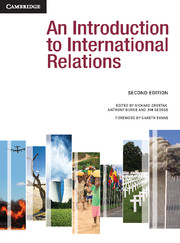Book contents
- Frontmatter
- Contents
- Tables, Figures and Boxes
- Contributors
- Preface and acknowledgements
- An Introduction to International Relations: The origins and changing agendas of a discipline
- 1 Theories of International Relations
- 2 The Traditional Agenda
- 3 The New Agenda
- 21 The United Nations
- 22 Non-State Actors: Multinational Corporations and International Non-Governmental Organisations
- 23 Religion and Secularism
- 24 Global Economic Institutions
- 25 Global Trade
- 26 Global Finance
- 27 Global Poverty, Inequality and Development
- 28 Globalisation and Its Critics
- 29 Global Terrorism
- 30 Post-Conflict State-Building
- 31 Humanitarian Intervention
- 32 Human Rights
- 33 Migration and Refugees
- 34 Global Environmental Politics
- 35 Climate Change
- Glossary of Terms
- Bibliography
- Index
- References
35 - Climate Change
from 3 - The New Agenda
- Frontmatter
- Contents
- Tables, Figures and Boxes
- Contributors
- Preface and acknowledgements
- An Introduction to International Relations: The origins and changing agendas of a discipline
- 1 Theories of International Relations
- 2 The Traditional Agenda
- 3 The New Agenda
- 21 The United Nations
- 22 Non-State Actors: Multinational Corporations and International Non-Governmental Organisations
- 23 Religion and Secularism
- 24 Global Economic Institutions
- 25 Global Trade
- 26 Global Finance
- 27 Global Poverty, Inequality and Development
- 28 Globalisation and Its Critics
- 29 Global Terrorism
- 30 Post-Conflict State-Building
- 31 Humanitarian Intervention
- 32 Human Rights
- 33 Migration and Refugees
- 34 Global Environmental Politics
- 35 Climate Change
- Glossary of Terms
- Bibliography
- Index
- References
Summary
Introduction
This chapter gives an overview of the theory and practice of global climate politics. First, it provides a brief history of the politics of climate change as they play out in the international negotiations on the issue overseen by the United Nations (UN). Second, it looks at the formal organisational and institutional structures that exist to manage the international community’s response to climate change. Third, it reviews the ways in which different theories of International Relations (IR) have been applied to climate change, assessing both their potentials and limitations. Finally, the conclusion offers some thoughts on the evolving nature of the ‘global’ governance of climate change.
The issue of global climate change (see Box 35.1) has moved to the centre of the international agenda in recent years. As scientific consensus about the severity of uncontrolled warming strengthens around the idea that nations should take immediate steps to reduce their contribution to climate change, politicians are under pressure to act. Yet the fact that climate change is caused by such a wide array of everyday human activities creates a coordination and cooperation challenge of staggering proportions. Added to this, the uneven contribution of nations to the problem and the uneven exposure of different social groups to the worst effects of climate change make it an issue of social justice since, for the most part, those who will suffer the worst impacts of climate change have contributed least to the problem. This links climate change to broader North–South debates about aid, finance, technology and development. Also, despite the fact that many people in vulnerable locations are already exposed to the effects of climate change, some of the most dramatic effects will not be felt for many years to come. This introduces the complex question of inter-generational justice while providing few incentives for this generation of politicians to bear the brunt of the costs of taking actions from which unborn children will be the primary beneficiaries.
- Type
- Chapter
- Information
- An Introduction to International Relations , pp. 475 - 486Publisher: Cambridge University PressPrint publication year: 2011



